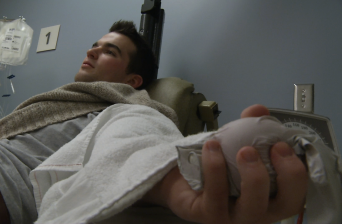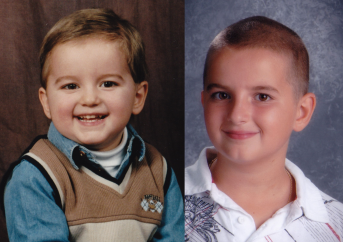A call to arms: Donating blood turns into healthy competition

Sometimes when you see something that needs doing, you just roll up your sleeves and do it. When medical student Dan Carr ’13 saw a flyer seeking blood donors to ease an unexpected shortage, he quite literally rolled up his sleeves and donated a unit of whole blood at the UMass Memorial Blood Donor Center on A level, downstairs from the hospital’s emergency room on the University campus. While he was in the reclining donation chair, however, Carr learned that not only does the Blood Donor Center experience worrisome periodic shortages, but a great many of his fellow students—all potential donors—are simply unaware of the center and its need.
“There are nearly 500 medical students on this campus,” said Carr. “But many of them, like me, arrive here as first years with no knowledge of the Blood Donor Center and its importance to the hospital’s patients. Classmates I talked to all were willing to donate once they learned about the center.”
Carr struck upon the idea of using the House Cup to encourage students to donate. The House Cup is a new tradition among the Medical School’s five learning communities, or houses—Blackstone, Burncoat, Kelley, Quinsigamond and Tatnuck—and students earn points for their houses through service-oriented activities. The house with the most points at the end of the school year wins the cup and bragging rights. Carr, of Blackstone House, proposed a point system for blood donation (two points for each platelet donation, one for whole blood and one for successfully recruiting a friend from another school) and worked with staff at the center to establish a recording system for donors.
An even better reason to donate
Beyond points for the House Cup, there is a more compelling reason to donate: patients need it.
“We rely on our donors to help us keep an ample supply at all times,” said Eileen Karr. “Patients need us every day.”
Taylor Cameron of Leominster is one of those patients. Just 3.5 years old when he was diagnosed with acute lymphoblastic leukemia, a cancer of the white blood cells, Taylor underwent grueling chemotherapy and needed countless units of platelets and blood products. Although he relapsed and required a second round of treatment, Taylor is now a healthy 11-year-old and frequently visits the Blood Donor Center with his mother and grandmother, who both have become regular platelet donors in thanks for Taylor’s treatment. “We were in need and the supply was there for us, so this is my way to pay back,” said Taylor’s mother Lisa Cameron. “I never had to worry that the hospital wouldn’t have platelets when Taylor needed them. I never gave it a second thought.”
Though she said she feels she can never fully repay the gift her family received, Lisa was gratified last year to learn that her platelets were a close match for a patient in need, a mother due to deliver her second child, who needed platelets on hand for possible complications. “There’s always someone who needs platelets, and you just never know if you’ll be the perfect match for someone. Of course you’d want to help, wouldn’t you?” she said.
“The students are generous with their time and their donations, but like others on campus, they often don’t think to come down and donate,” said Eileen Galvin Karr, RN, BSN, Blood Donor Center supervisor. “We loved Dan’s idea of generating a little competition among the houses; the students can gain easy points for their houses while also establishing what we hope will be a life-long habit of donating.”
Karr said that UMass Memorial Medical Center transfuses more than 30,000 blood products each year and collects a portion of those itself (about 15 percent of red cells are donated on campus, along with 50 percent of platelets; the rest are acquired from organizations such as the Red Cross). Nationally, about 37 percent of the population is eligible to donate, but only about 10 percent do so. She noted that only a small percentage of the center’s donors are from the Medical School, something Carr is working to change.
The houses are scheduling group donations and are regularly reminding house members to make donation appointments as they keep an eye on each other’s tallies and vie for the House Cup. Carr himself has switched to donating platelets, which can be done as often as every two weeks instead of eight, though it takes approximately 90 minutes to complete a platelet donation, versus just 15 or so for a whole blood donation.
Though Carr, of course, hopes his house wins the House Cup, he’s more interested in increasing the number and frequency of blood donations his classmates make. He’s already hoping to include faculty and staff in future competitions, noting the thousands of potential donors on campus every day.
“I’m in medical school so I can one day help people. I have to wait until my clinical years to actually work with patients, but donating blood lets me help someone right now,” he said.
For more information about donating blood at UMass Memorial Blood Donor Center, visit http://www.umassmemorial.org/MedicalCenterIP.cfm?id=1839
